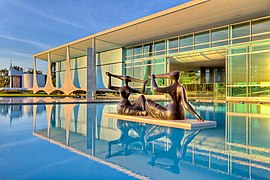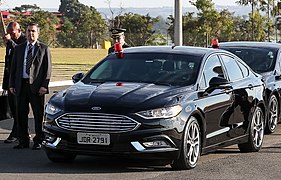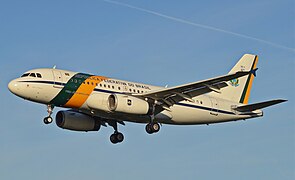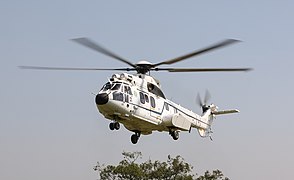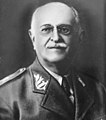
The President of Colombia is the head of state and head of government of the Republic of Colombia. The president heads the executive branch of the national government and is the commander-in-chief of the Military Forces of Colombia.

The national flag of Brazil, is a blue disc depicting a starry sky spanned by a curved band inscribed with the national motto "Ordem e Progresso", within a yellow rhombus, on a green field. It was officially adopted on 19 November 1889 — four days after the Proclamation of the Republic, to replace the flag of the Empire of Brazil. The concept was the work of Raimundo Teixeira Mendes, with the collaboration of Miguel Lemos, Manuel Pereira Reis and Décio Villares.

Manuel Deodoro da Fonseca was a Brazilian politician and military officer who served as the first president of Brazil. He was born in Alagoas in a military family, followed a military career, and became a national figure. Fonseca took office as provisional president after heading a military coup that deposed Emperor Pedro II and established the First Brazilian Republic in 1889, disestablishing the Empire. After his election in 1891, he stepped down the same year under great political pressure when he dissolved the National Congress. He died less than a year later.

Afonso Augusto Moreira Pena, often referred to as Afonso Pena, was a Brazilian lawyer, professor and politician who served as the 6th president of Brazil from 1906 until his death in 1909. Pena was elected in 1906, the chosen successor of president Rodrigues Alves. Pena was the first politician from Minas Gerais to win the presidency, ending the series of São Paulo politicians who had held the presidency since 1894. Before his presidency, he served as the 4th Vice President of Brazil under Rodrigues Alves (1903–1906) after the death of Silviano Brandão. Pena was a monarchist. He was the only member of Emperor Pedro II's cabinet to become president of Brazil and the first Brazilian president to die in office.
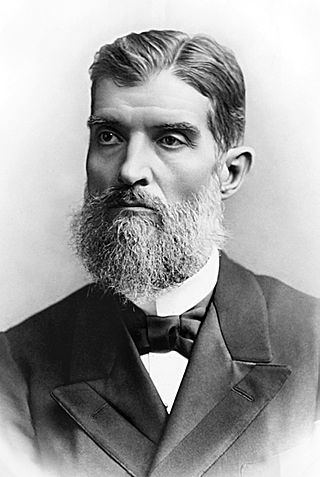
Prudente José de Morais e Barros was a Brazilian lawyer and politician who was the third president of Brazil. He is notable as the first civilian president of the country, the first to be elected by direct popular ballot under the permanent provisions of Brazil's 1891 Constitution, and the first to serve his term in its entirety. His presidency, which lasted from 15 November 1894 until 14 November 1898, was marked by the War of Canudos, a peasant revolt in the northeast of the country that was crushed by the Brazilian Army. He also had to face a break in diplomatic relations with Portugal that was successfully mediated by Queen Victoria of the United Kingdom.

The vice president of Brazil, officially the vice president of the Federative Republic of Brazil, or simply the vice president of the republic is the second-highest ranking government official in the executive branch of the Government of Brazil, preceded only by the president. The vice president's primary role is to replace the president in the event of their death, resignation, or impeachment, and to temporarily take over the presidential powers and duties while the president is abroad, or otherwise temporarily unable to carry out their duties. The vice president is elected jointly with the president as their running mate.

The Palácio do Planalto in Brasília is the official workplace of the president of Brazil. The building was designed by Oscar Niemeyer in 1958 and inaugurated on 21 April 1960. It has been the workplace of every Brazilian president since Juscelino Kubitschek. It is located at the Praça dos Três Poderes, to the east of the National Congress of Brazil and across from the Supreme Federal Court.

The presidential line of succession defines who may become or act as President of the Federative Republic of Brazil upon the death, resignation, incapacity or removal from office of the elected president, and also when the president is out of the country or is suspended due to impeachment proceedings.

The Minister of State Head of the Civilian House of the Presidency of the Republic is the chief of staff of the Presidency of the Federative Republic of Brazil, and a member of the president's cabinet. The post was established on 1 December 1938.

The president of the Federal Senate, sometimes referred to as the President of the Senate, is the presiding officer of the Federal Senate of Brazil.

The inauguration of the president of Brazil is composed of several ceremonies that happen in the same day. Through democratic elections or coups, resignations and deaths, presidential inaugurations have been important events in Brazilian history.

The Presidential Guard Battalion, also known as Duke of Caxias Battalion, or by its historical designation Emperor's Battalion, is a unit of the Brazilian Army and honour guard to the President of Brazil. Two other units, the 1st Guards Cavalry Regiment and the Cayenne Battery, are also part of the presidential honour guard unit. It is currently a part of the Planalto Military Command.
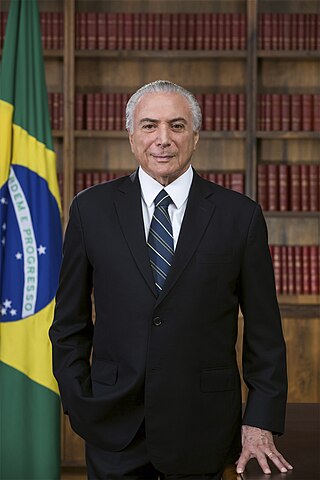
Michel Miguel Elias Temer Lulia is a Brazilian politician, lawyer and writer who served as the 37th president of Brazil from 31 August 2016 to 1 January 2019. He took office after the impeachment and removal from office of his predecessor Dilma Rousseff. He had been the 24th vice president of Brazil since 2011 and acting president since 12 May 2016, when Rousseff's powers and duties were suspended pending an impeachment trial.
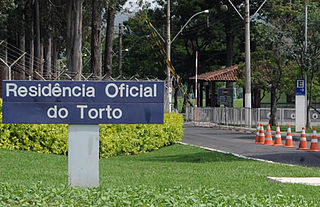
The Granja do Torto is an official residence maintained by the Presidency of Brazil. It is a property with ranch-style features, located on the outskirts of the capital city of Brasília. It is used mainly as a weekend retreat by the president.

General elections were held in Brazil on 7 October 2018 to elect the president, National Congress and state governors. As no candidate in the presidential election received more than 50% of the vote in the first round, a runoff round was held on 28 October.

The President of the Supreme Federal Court is the highest-ranking officer of the Brazilian judiciary branch. The holder is also president of the National Council of Justice (CNJ). Among their responsibilities are representing both the Court and the council before other branches of government and authorities, presiding over plenary sessions of both institutions, enforcing the bylaws of the Court and Council, deciding points of order in their respective sessions, making decisions on injunctions during recess or vacation, and swearing in justices of the Supreme Court and councillors of the CNJ.

Presidential elections are scheduled to be held in Portugal in January 2026. The elections will elect the successor to President Marcelo Rebelo de Sousa, who is barred from running for a third term.

In Brazil, the Council of the Republic is the superior agency of consultation and counseling of the Presidency of the Republic, created to advise the president in crisis moments. Among the competences of the Council of the Republic are deliberate about subjects such as federal intervention, state of defence and state of exception.
The Secretariat of Institutional Affairs is an agency linked to the Presidency of the Republic of Brazil. It was formed through Provisional Measura no. 259 of 21 July 2005 and converted into Law no. 11204 of 5 December 2005. It acted in the following areas:
- Political coordination of the Government;
- Conduction of the relationship between the Government, the National Congress and political parties;
- Interlocution with States, the Federal District and Municipalities;
- Coordination of the working of the Social and Economic Development Council.







